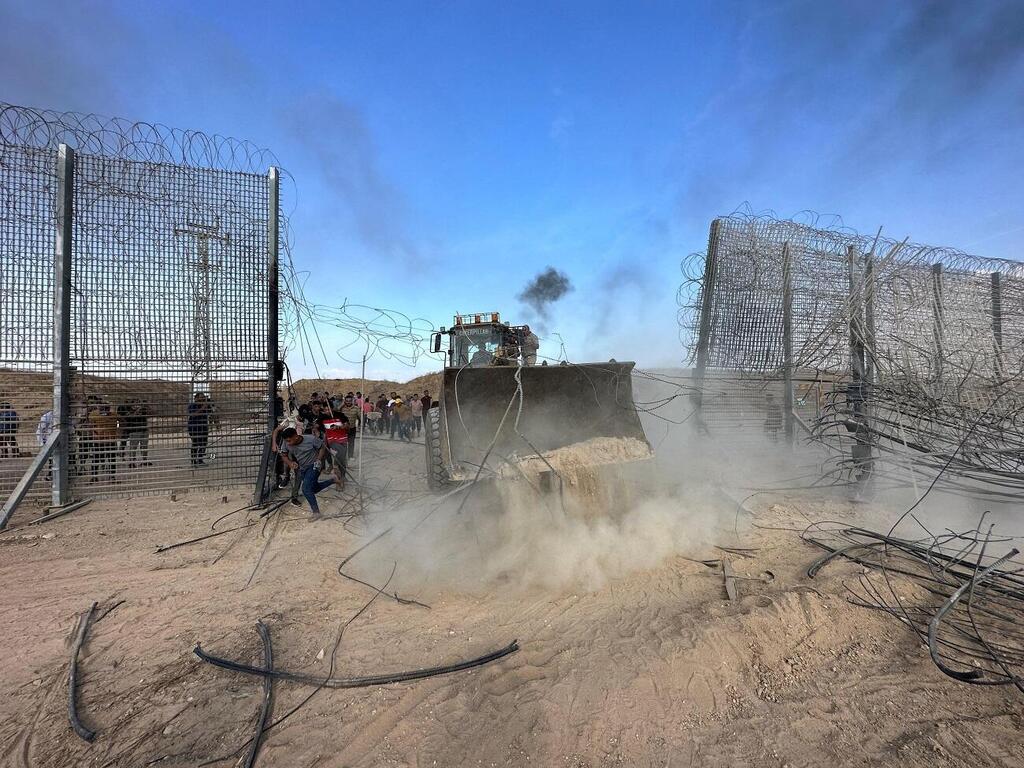Yousef Masoud, a Gaza-based photojournalist who accompanied Hamas terrorists on October 7 and documented the atrocities, won this week the George Polk Award for Photojournalism, one of the field's highest accolades.
Read more:
Masoud was one of several Gaza-based journalists "whose early morning presence at the breached border area raises serious ethical questions," according to a report by the pro-Israel media watchdog HonestReporting published last November, sparking a worldwide debate over the ethics of press photographers from global media outlets accompanying Hamas terrorists during the attack and whether they had any foreknowledge of the incursion into southern Israel.
1 View gallery


Palestinians bursting through the Gaza-Israel border fence on October 7
(Photo: Reuters)
According to a statement by Long Island University, which presents the award annually, Masoud, along with fellow Gazan journalist Samar Abu Elouf, was cited for "chronicling Israel’s bombardment and invasion of their homeland, Gaza."
"The two photographed the conflict from its opening hours on Oct. 7 until they escaped the territory exactly two months later," the statement read.
"Under harrowing circumstances, they captured gripping and unforgettable images. Of frightened children looking skyward toward an Israeli plane. Of bodies pulled from the rubble of flattened buildings. Of a little boy touching the bloodied face of his dead baby sister. And of the chaos of hospitals overwhelmed by dazed, gravely injured patients."
The HonestReporting report raised questions about the documentation of war crimes committed by Hamas terrorists in southern Israeli communities on October 7 by foreign press photographers working for news agencies Associated Press, Reuters, CNN and The New York Times.
The report suggested that these photographers might have had prior knowledge of Hamas' plans, enabling them to prepare accordingly - claims later denied by the media outlets.
The Prime Minister's Office responded furiously, emphasizing the severity of the phenomenon where press photographers associated with international media participate in covering Hamas' atrocities, demanding clarifications.
Minister Benny Gantz said, "They are no different from the terrorists - and should be treated as such."
CNN told Ynet in response to the report that it "decided to suspend all ties” with Hassan Eslaiah, a freelance journalist who was documented embracing with Hamas leader in Gaza Yahya Sinwar.
Hassan Eslaiah, a freelancer who also works for CNN, reporting near a burning Israeli tank on October 7
Reuters, which purchased photos from the photographer, said that the photos they acquired from freelance photographers were taken about two hours after Hamas launched the attack and started firing rockets into Israel.
"Reuters categorically denies that it had prior knowledge of the attack or that we embedded journalists with Hamas on Oct 7. Reuters acquired photographs from two Gaza-based freelance photographers who were at the border on the morning of Oct. 7, with whom it did not have a prior relationship,” the news agency said.
Reuters and AP refused to say whether they would sever work ties with the photographers, but have continued to use additional photos taken by them in the following month, including from Rafah.
The New York Times rejected criticism after its photographer in Gaza was signaled out for filming the Hamas massacre on October 7. The paper said he was covering events as they unfolded as was his job.
"The accusation that anyone at The New York Times had advance knowledge of the Hamas attacks or accompanied Hamas terrorists during the attacks is untrue and outrageous," the newspaper said.
"It is reckless to make such allegations, putting our journalists on the ground in Israel and Gaza at risk. The Times has extensively covered the Oct. 7 attacks and the war with fairness, impartiality, and an abiding understanding of the complexities of the conflict."
The newspaper sharply criticized the Foreign Ministry in a public statement, responding to its outreach to the Foreign Press Association. The communication, directed at ministry spokesperson Lior Haiat conveyed the newspaper's viewpoint that the Israeli government's statements lacked factual basis.
The response highlighted that the criticism extended beyond The Times to encompass independent photographers covering conflict zones, asserting that the ministry's stance not only posed a risk to these individuals but also jeopardized the essential journalistic efforts necessary for the global understanding of war realities.





